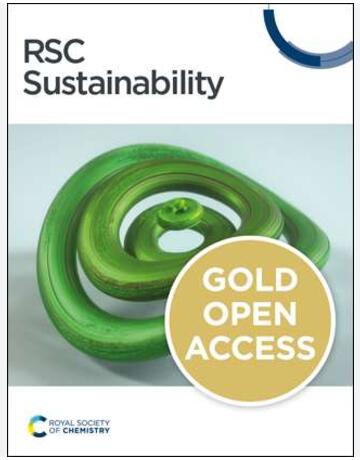Optimization of Municipal Waste Streams in Achieving Urban Circularity in the City of Curitiba, Brazil
IF 3.3
3区 环境科学与生态学
Q2 ENVIRONMENTAL SCIENCES
引用次数: 3
Abstract
The municipal solid waste (MSW) remains a great challenge in most cities of developing countries, as the majority of the generated waste is either not collected or is dumped in open uncontrolled non-engineered landfill sites, creating significant pollution due to the leakage of landfill leachate in the surrounding environment. In developing countries, a complete transition to a zero-landfill scenario is less likely to happen in the near future due to various socio-economic challenges. Therefore, the existing landfills in developing countries need holistic waste management thinking with more efforts on waste to energy conversions. This study highlights the challenges with existing MSW management practices of Curitiba, Brazil, and suggests some holistic and sustainable landfill management techniques. This is accomplished through the (i) identification of the suitable sites for setting up transfer stations (TSs), (ii) route optimization for MSW transportation, and (iii) analysis of the life expectancy of the existing landfill with waste valorization techniques for enhancing circularity of MSW of the city. The study has identified six potential TSs, making use of various geological criteria and constraints as suggested by the United States Environmental Protection Agency using GIS-based spatial analysis, which could save fuel cost of approximately 1.5 million Brazilian Real (BRL) per year for the solid waste transportation (from the source to the landfill site). This research has also made a value addition in this specific field with the preparation of a digitized road network map of the study region. Further, the sensitivity-based scenario analysis highlights that the lifespan of the existing landfill (until 2030) might be extended to 2058 if the city achieves the targeted recycling rate of 85% compared with the current rate of 23%. The results would be useful for policy-makers to adopt the crucial MSW scenario to achieve a circular economy in the waste management of the city of Curitiba.巴西库里蒂巴市实现城市循环的城市废物流优化
城市固体废物(MSW)在发展中国家的大多数城市仍然是一个巨大的挑战,因为大多数产生的废物要么没有被收集,要么被倾倒在开放的、不受控制的非工程垃圾填埋场,由于垃圾渗滤液在周围环境中的泄漏,造成了严重的污染。在发展中国家,由于各种社会经济挑战,在不久的将来不太可能完全过渡到零垃圾填埋。因此,发展中国家现有的垃圾填埋场需要全面的废物管理思想,并在废物转化为能源方面做出更多努力。本研究强调了巴西库里蒂巴现有城市生活垃圾管理实践的挑战,并提出了一些全面和可持续的垃圾填埋管理技术。这是通过以下方式实现的:(i)确定设立转运站的合适地点,(ii)城市生活垃圾运输路线优化,以及(iii)利用废物定价技术分析现有垃圾填埋场的预期寿命,以提高城市生活垃圾的循环性。该研究利用美国环境保护局提出的各种地质标准和限制条件,利用基于GIS的空间分析,确定了六个潜在的TS,这可以为固体废物运输(从源头到填埋场)每年节省约150万巴西雷亚尔的燃料成本。这项研究还通过编制研究区域的数字化道路网络图,在这一特定领域增加了价值。此外,基于敏感性的情景分析强调,如果该市实现85%的目标回收率,而目前的回收率为23%,那么现有垃圾填埋场的使用寿命(到2030年)可能会延长到2058年。研究结果将有助于决策者采用关键的城市生活垃圾情景,以实现库里蒂巴市废物管理的循环经济。
本文章由计算机程序翻译,如有差异,请以英文原文为准。
求助全文
约1分钟内获得全文
求助全文
来源期刊

Sustainability
ENVIRONMENTAL SCIENCES-ENVIRONMENTAL SCIENCES
CiteScore
6.80
自引率
20.50%
发文量
14120
审稿时长
17.72 days
期刊介绍:
Sustainability (ISSN 2071-1050) is an international and cross-disciplinary scholarly, open access journal of environmental, cultural, economic and social sustainability of human beings, which provides an advanced forum for studies related to sustainability and sustainable development. It publishes reviews, regular research papers, communications and short notes, and there is no restriction on the length of the papers. Our aim is to encourage scientists to publish their experimental and theoretical research relating to natural sciences, social sciences and humanities in as much detail as possible in order to promote scientific predictions and impact assessments of global change and development. Full experimental and methodical details must be provided so that the results can be reproduced.
 求助内容:
求助内容: 应助结果提醒方式:
应助结果提醒方式:


